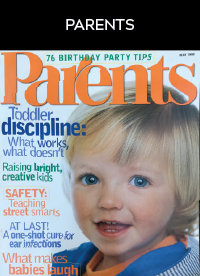
The Mother-Daughter Bond
Nothing tests – or strengthens – this relationship like the birth of a baby.
READ FULL ARTICLE BELOW
I can remember just about every time my mother praised my skills as a parent. It’s not that the times were so few – it’s just that her words of approval mean so much to me. Just recently, my mom and I were sitting at my kitchen table about to give dinner to my two daughters, Nicole, 4, and Emily, 2. Emily demanded to eat hers on the family-room couch in front of the TV, and when I told her no, she cried and threw her first full-fledged tantrum. I ignored her tears, and after five minutes of pure hysteria, Emily calmed down and came to join her sister at the kitchen table.
“How did you do that?” my mom asked admiringly. “I never would have been able to hold out like that.” I felt as if I had just won the Academy Award of motherhood.

After my first child was born, the bond my mother and I shared quickly took on a new dimension and complexity; we were no longer just mother and daughter but mother and mother. My giving birth granted me a new status, wherein we could be equals. We had both passed a major adult milestone. But what I didn’t anticipate was how many new strands would be woven into our already intricate relationship. Suddenly I wanted to know more about my mother’s history: How had she adapted to motherhood? Did she feel isolated? To whom did she go for advice? I longed for her guidance, yet I felt ambivalent. Part of me wanted to show her I could make the decisions about my baby’s care all by myself.
“The mother-daughter dynamic is extremely complicated, and for some [having a baby provides the] perfect window of opportunity to re-evaluate the relationship,” says Marilyn Irwin Boynton, a family therapist in Toronto and coauthor of Goodbye Mother, Hello Woman: Reweaving the Daughter-Mother Relationship (New Harbinger). It’s natural for new mothers to compare themselves to their own mothers. Often we analyze which behaviors we’d like to emulate and which we’ve sworn absolutely never to repeat.
A common interest in your child can bring you and your mother closer than ever.
“Daughters want to do better than their mothers did, but the realities of parenthood – the fatigue and frustration – make them less judgmental in their criticism,” says Naomi Lowinsky, Ph.D., a Jungian analyst in Berkeley, California, who specializes in women’s issues. “You may have promised yourself you’d never tell your child to do something ‘because I said so’ – and suddenly those very words are coming out of your mouth.” This doesn’t mean that you can’t choose to be different from your mother, says Lowinsky. It just takes a lot of work to change behavior that is so deep-rooted and automatic.
“To figure out whether your behavior is a reflection of the past or a real response to your real children in the present, ask yourself some questions,” Lowinsky suggests. “’Is this about me and my parents, or what my kids are experiencing? Am I bringing something from my own childhood into this?’ Taking a step back to watch your own reactions can help you understand the type of mother you are, and how you resemble your own mother.”
Take into account how you and your mother differ
Helen Epstein, a mother of two in Cambridge, Massachusetts, and author of the memoir Where She Came From: A Daughter’s Search for Her Mother’s History (Little, Brown), believes that part of her mothering style is a natural continuation of her mother’s – while the rest is decidedly different. “My mother was very organized and structured, and I’m the same way,” she says. “I get my kids up and out quickly, and I’m at work by 9 a.m., just like my mother was.” On the other hand, Epstein tries to be much less critical of her children because, she says, her mother seldom praised her. “For instance, she had high expectations for the way my two brothers and I looked – our hair had to be brushed, our clothes just so – but she almost never acknowledged it. In fact, she rarely told us we did anything well,” Epstein recalls. “So when my sons look nice, I make sure to let them know. And when they clean their room, I shower them with compliments. I try to be encouraging with them rather than critical.”
 Many moms feel the urge to get closer
Many moms feel the urge to get closer
Despite differences in mothering styles, many women find that the transformation to motherhood mends a long-standing rift in the mother-daughter relationship. After an adolescence often spent fighting dependency on Mom and a young adulthood during which it seemed dangerous to reveal personal feelings and experiences to her, new mothers suddenly feel the urge to get closer. “For the first time in a long time, I wanted and needed my mother’s advice,” says Epstein. “There were so many things I wanted to know, like how to deal with illness or how to discipline.”
For your mother, becoming a grandmother may be the first concrete affirmation that she herself has succeeded as a mother. The fact that you are following in her footsteps can foster a deep sense of pride and accomplishment. And not only will she share in your adoration of the new life you’ve produced, but she’ll probably be the only one – other than the proud father – who will derive as much pleasure as you do from discussing every little detail and nuance of baby care. This common love and understanding can create an almost psychic connection between you and your mother. When Beth Matkom, of Milwaukee, feels overwhelmed caring for her two children (there’s a third on the way), her mother often comes to her rescue. “I had a black-tie event to go to, but couldn’t manage to get out of the house to buy what I needed. My mom went out and bought me things, such as pantyhose and shoes, and when the shoes turned out to be too small, she returned them for a bigger size,” says Matkom. “We talk on the phone every day, and she just senses when I need some help. And more often than not, I accept it.”
Many new moms find at this stage of their lives that they need to be mothered themselves. Says Audrey Reny, a Boston mother of two: “I was so upset when I started breastfeeding because my baby wasn’t latching on properly, and I was in great pain. Even though my mother hadn’t breast-fed me or my sister, she was very supportive. She would sit and read to me from baby-care books about what I was supposed to be doing.” Reny recalls that “even though my mom found it hard to understand why I would put myself through this, she encouraged me to do what I wanted. She became more of a friend and confidante since I’ve had children.”
But this new mother-daughter dynamic doesn’t always adapt so smoothly. For those women who reach out to their mother for support and are rebuffed, this can be a very painful and disappointing time. (See “The Reluctant Grandmother” sidebar)
By contrast, a grandmother can seem almost too doting. “My mother is only interested in me as a conduit to her grandchildren,” says a mom in Stamford, Connecticut. “Before I had kids, we used to talk about things going on in my life. Now she says that having children is the best thing I’ve never ever done, which diminishes my other accomplishments in her eyes.”
Honest dialogue can breach the walls of resentment, says Lowinsky. “A grandmother may feel that loving your child is an extension of loving you,” she notes. “But you can talk about your need for her to value your development in other ways. Sharing your feelings is what builds intimacy between mother and daughter.”
Yet it’s hard to be honest when your opinions might hurt your mother’s feelings. “My mother is 72 years old and completely out of touch with baby care,” says a mother in Franklin, Kentucky. “The other day she suggested giving our son some salad, and he’s only 6 months old! I’m afraid to leave them together, but she’s always asking to baby-sit.”
Find a gentle was to disagree with her advice
Even younger grandmothers may not have breast-fed their children, used disposable diapers, or had to contend with the issues of going back to work or day care. As a result, your mom’s advice can seem dated or uncalled for. “You have to find a gentle way to disagree with her,” says Lowinsky. “You can say, ‘I appreciate your advice but my experience with this is different.’ Speak from your own experience – and try not to psychoanalyze your mother.”
For women who have lost their mother, the joy of having a baby is tempered with feelings of regret and sadness. A few months after Nancy Piltzecker, of Eastham, Massachusetts, had her first son, her mother passed away. “There are so many moments I wish I could have shared with her,” says Piltzecker. “Things she said come back to me, such as the amazing moment when a baby discovers his hands and does what she used to call ‘hand ballet.’ As I watched my son find his hands, I saw just what she meant, and longed to pick up the phone and tell her.”
One healing effect of becoming a grandmother is the chance for your mother to rectify some of the things she did during your childhood. When Beth Matkom was a baby, her mother went back to school and was often too busy studying to play with her infant daughter. “After she became a grandmother,” Matkom says, “I think she looked back and wished she had paid more attention to me during that stage. As a result, she makes a big effort to interact with my children, reading to them and playing a lot more than she says she did with me.”
To ease the shifting balance between mother and daughter, it’s essential to keep a sense of humor. Audrey Reny discovered some unexpectedly funny things about her mom’s early days as a parent when she looked at old photographs. “In one of the pictures, my mother is giving me solid food for the first time. I guess she didn’t have any baby spoons around, so she fed me with a butter knife,” Reny recalls with a laugh. “Now I kid her all the time about how she fed me with a knife.”
As you move through this stage in your life, there are bound to be new issues that surface between you and your mother, as well as old ones that remain unresolved. You’re destined to fluctuate between both of your roles – daughter and mother – reflecting on your past and present and creating a new identity for the future. Motherhood adds yet another layer of complexity to the mother-daughter bond. Only this time, there’s a lot more room for friendship.
Big Ideas

It’s thrilling to see your love for Mom reflected in your child.
Your style may be different, but she needs to respect it.
Motherhood puts you on equal footing.
Your child will benefit from close family connections.
New mothers often analyze which behaviors they’d like to emulate and which ones they’ve sworn never to repeat.
The Reluctant Grandma
What if you’ve spent the past nine months envisioning a doting grandmother who’s happy to be at your beck and call? Then the baby arrives – and your mother doesn’t even come close to fitting that description. There are several reasons why your mom may not meet your expectations, says Naomi Lowinky, Ph.D., a psychoanalyst who specializes in women’s issues.
Your mother may:
Deny she’s again, or see herself as too young to be a grandmother
Be very busy with her own life, whether she’s working or retired
Feel out of practice with baby care and hesitant to take on the responsibility
Not be interested in helping because she’s already “paid her dues”
What’s a new mother to do? “You may just have to accept what your mother can and can’t give you,” says Lowinsky. “She may have reached a point in her life where she wants the kind of freedom she’s never had.”
Try talking with your mother as early as possible about what type of involvement you both envision for her as a grandmother. She may not want to babysit on weekends, but would be happy to take your family out for dinner; or she may pitch in, provided you bring the baby to her house.
Remember that your baby has also changed your mother’s role in life, and it may take time for her to adjust. And just as there’s no such thing as a perfect grandmother either.





